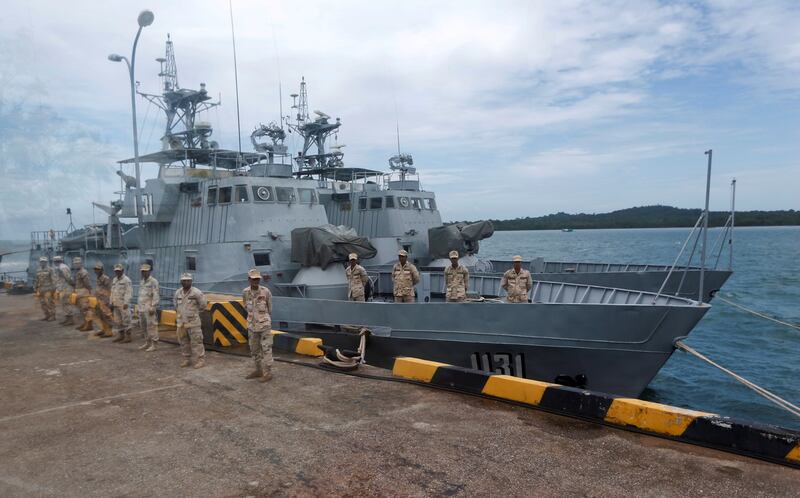U.S. Secretary of Defense Lloyd Austin arrived in Phnom Penh on Tuesday for a brief visit, days after Cambodia and China wrapped up their biggest ever military exercise.
During his one-day visit, Austin will meet top Cambodian officials “to discuss defense issues with the new Cambodian leadership,” the U.S. Embassy in Phnom Penh said in a statement.
“This is the first bilateral visit by a U.S. Secretary of Defense, and it is the second for Secretary Austin following his attendance at the ASEAN Defense Ministers Meeting-Plus in November 2022,” it said.
Austin arrived in Cambodia from Singapore where he attended the annual Shangri-La Dialogue security forum. During the conference, the secretary sought to reassure U.S. allies of Washington’s “iron-clad” commitment in the region in the face of growing rivalry with China.
China and Cambodia have just held a 15-day military exercise, both on land and at sea, with the participation of three Chinese warships, two of which have been in Cambodia for six months at the Ream naval base.
The two corvettes were still seen docked at the base in Sihanoukville on Monday. The U.S government has said it has “serious concerns” about China’s plans for exclusive control over portions of the Ream Naval Base. Cambodia has repeatedly denied handing the base over to China.
U.S.-Cambodian relations have become strained during the past decade partly over U.S. concerns about the suppression of Cambodia’s political opposition.
In 2017, the Cambodian government suspended the joint Angkor Sentinel exercises between the two militaries and in 2018, the U.S. government suspended military assistance to Cambodia in response to its suppression of the opposition.
Cambodia under veteran leader Hun Sen rejected U.S. criticism of its domestic political conditions and built closer relations with China. Hun Sen stepped down as prime minister last year with his son, Hun Manet, taking over
Turning a new page?
Soon after arriving in Phnom Penh, Austin paid a courtesy call on Hun Sen, who is now president of the Senate. Hun Sen was accompanied by former defense minister Tea Banh in the meeting.
Austin also met Prime Minister Hun Manet, a West Point military academy graduate, and Defense Minister Tea Seiha.
Hun Manet and Tea Seiha are Hun Sen’s and Tea Banh’s sons, respectively.
Chhengpor Aun, research fellow at The Future Forum, a Cambodian think-tank, said Austin’s visit gave Cambodia’s new leaders the opportunity to highlight more balance in their country’s diplomacy.
“Secretary Austin will be much welcomed in Phnom Penh in general because his presence will help back up the Cambodian government’s attempt to prove it is still on the course of its promised neutrality in foreign relations,” said Chhengpor Aun.
"The Ream naval base, the ever-growing Sino-Cambodian defense relations, and strained military-to-military ties between Phnom Penh and Washington will highly likely dominate Secretary Austin’s meetings with senior Cambodian officials.”

Another analyst – Nguyen Khac Giang, visiting fellow at Singapore’s ISEAS-Yusof Ishak Institute – said that Austin's decision to visit Cambodia instead of the close ally the Philippines or newly elevated strategic comprehensive partner Vietnam, “reflects the U.S.’s attempt to reconcile deteriorating U.S.-Cambodia relations.”
“With Phnom Penh successfully transitioning leadership from Hun Sen to his son Hun Manet, Washington likely views this as a good moment for rapprochement,” Giang told Radio Free Asia, adding that while sensitive topics such as Chinese influence and the Ream naval base are likely be discussed, he thinks both sides “will focus more on potential cooperation and common interests, particularly as Cambodia will serve as the coordinator of the U.S.-ASEAN Dialogue Relations from 2024 to 2027.”
The state-aligned Khmer Times newspaper said that with Hun Manet's "outward-looking policies," there's a unique prospect to recalibrate any misunderstanding and to start a new chapter in the two countries' relationship, provided that both sides "are genuinely sincere with each other."
The article by Pou Sothirak, senior advisor to the Cambodian Center for Regional Studies, and Him Raksmey, executive director of the Cambodian Center for Regional Studies suggested that the first thing for the U.S. to do wais to rethink its policy of targeted sanctions on Cambodian officials and members of the business elite, and restrictions on trade preferences “which are ineffective and counterproductive, compelling Cambodia deeper into economic reliance on China.”
The Future Forum’s Chhengpor Aun agreed that the new generation of Cambodian leaders “presents a window of opportunities for improvement of U.S. relations” as Cambodia wants to secure a stable state of relations with the U.S., now its biggest export destination.
Cambodia sold US$8.89 billion worth of goods to the U.S. in 2023, about 40% of its total exports, according to the Cambodian General Department of Customs and Excise.
However, “if the visit aims to woo Cambodia away from China or to push political reforms in Phnom Penh, Secretary Austin can be disappointed,” said Chhengpor Aun.
“Sino-Cambodian ties are important for Phnom Penh political elites – be it the old guards or the new princeling generation – in terms of political and regime security,” he said.
Edited by Mike Firn.
